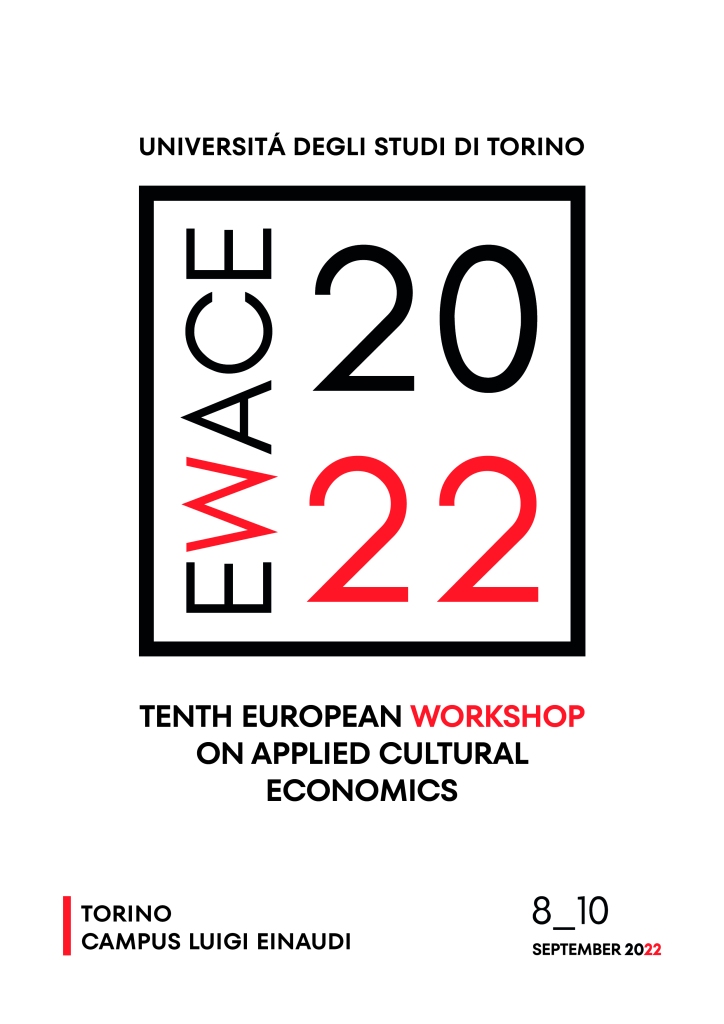By Association for Cultural Economics Poland

The European Workshop on Applied Cultural Economics (EWACE) returns to northern Italy to celebrate its 10th anniversary. Originally organised by Roberto Zanola (University of Eastern Piedmont) and Antonello Eugenio Scorcu (University of Bologna), this time taking place in Torino University 8 – 10 September 2022. Over 50 presentations, increasingly with multiple authors and with a balanced gender representation, evidence an active, creative, and engaged community of specialized economists worldwide.
It was a great couple of days in Turin, Italy, as members of the Association for Cultural Economics International gathered to finally meet face-to-face again and discuss their research at the 10th European Workshop on Applied Cultural Economics. Despite the recent pause in offline meetings, the cultural researchers have not stayed idle and arrived to Italy with new exciting ideas, topics and results to present.
As always at the ACEI events, the topic range was broad, encompassing print (e.g. Christiane Hellmanzik and Lukas Kuld), music (e.g. Ramadán Tovar), theatre (e.g. Aleksandra Wiśniewska), cultural heritage (e.g. Bartosz Jusypenko), tourism (e.g. María Devesa), streaming (e.g. Paul Crosby), video games (e.g. Jordi McKenzie), fashion (Monika Murzyn Kupisz), and much more.
A few strands of research stood out. Shortly after the opening of the workshop, Luis César Herrero-Prieto, chairing the session on valuation of cultural goods, announced the revival of non-market valuation of cultural goods. A great number of new studies appeared in the program of this year’s workshop, technically-advanced and following the state-of-the-art choice modelling guidelines. They included the estimation of the economic and social value that people assign to: Danish museums (Andrea Baldin), Victorian heritage assets in Australia (Bartosz Jusypenko, large-scale choice experiment aimed at valuation of immovable cultural heritage), and public libraries in Colombia (Jonathan Daniel Gómez). Policy relevance of these studies is easy to notice. A special focus has been put on issues neglected in earlier cultural valuations studies: e.g. the role of information and experience (Marco Ferdinando Martorana, study on the cultural heritage restoration projects), transferability of estimated values (Aleksandra Wiśniewska, the first international benefit transfer for performing arts, proving reliability of the method for the field and inviting cultural economists for its broader use), embedding effect (Andrea Baldin) or inclusion of imagery in valuation tasks (Bartosz Jusypenko). Presentations were followed by heated debates and valuable feedback from David Throsby and Trine Bille – authors of pioneering studies in this field.
Digitalization of cultural content accelerated during the COVID pandemic with more people also spending their time with digital entertainment. These trends were mirrored by the increased presence of studies devoted to these areas. Video games gradually enter the discussion with related presentations on backward compatibility of consoles (Jordi McKenzie), the Roblox game-platform (Satia Rożynek) or video game piracy (Wojciech Hardy). Paul Crosby presented a study about streaming platform preferences for in-home movie viewing in the presence of illegal channels, involving a discrete choice experiment conducted in four major western countries. Streaming and crowdfunding remain exciting and evolving areas, with further presentations by e.g. Elisabetta Lazarro and Anna Bernard.
It was great to see the cultural economy approached from the perspectives of other study fields. Participants were able to learn about the role of cultural and digital skills within the labour market of artists (Grazia Ascione), the effects of copyrights on digital availability of museum collections (Matthias Sahli) as well as the gender-related gaps in various contexts – be it ongoing music competitions (as in the presentations of Karol Borowiecki, Sophia Gaenssle, or Marc Law) or 200 years of book writing (presented by Christiane Hellmanzik and Lukas Kuld).

The workshop also gave a glimpse into new or growing (and exciting) methods and areas of research. Topics of NFTs (Roberto Cellini) or the metaverse (Satia Rożynek) appeared within the programme, and data collection through scraping (e.g. Matthias Sahli, Wojciech Hardy) or analyzing content features through machine learning (e.g. Anna Bernard) appeared as increasingly useful tools for the toolsets of empirical culture researchers.
Located in Italy, the workshop could not do without cultural heritage-related studies, including exciting talks about the past and presence of UNESCO World Heritage and its role in tourism development. Martina Dattilo showed a correlation between the number of criteria of Outstanding Universal Value and the quality assessment of UNESCO World Heritage Sites based on data from the early XXth century guidebooks. Enrico Bertacchini talked about the impact of the UNESCO World Heritage List designation on real estate prices and income. The successful workshop provided a platform for both senior and young researchers to discuss their ideas and contribute to ongoing projects on various cultural issues. In particular, the workshop was honoured by the presence of David Throsby and John O’Hagan, irreplaceable, experienced guides for younger researchers in the field. The participants came from several countries and despite European focus, as in the title of the workshop, a few continents. The offer of the conference, with three parallel sessions going on all times, highly exceeded an experience of any singular participant. Even writing this review in a group of three members of a strong Polish representation this year, we undoubtedly miss part of this excellent workshop. Full program and a selection of papers presented on EWACE 2022 are available on the event’s website.
Figure 1. Evolution of EWACE (by Karol Borowiecki)

Acknowledging the organizers of EWACE 2022, Enrico Bertacchini and the team from University of Turin, ACEI presidents announced the location of the next year biennial conference on cultural economics that will take place in June 2023 at the Indiana University in Bloomington, USA.
This post was writen by members of the Association for Cultural Economics Poland, Wojciech Hardy, Bartosz Jusypenko, Aleksandra Wiśniewska. The ACEP aims to support the development of the field in the region with the first occasion being the 1st Polish Conference on Cultural Economics that will be held in Warsaw in November 2022.
Leave a Reply